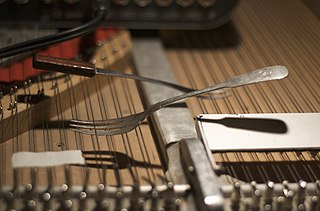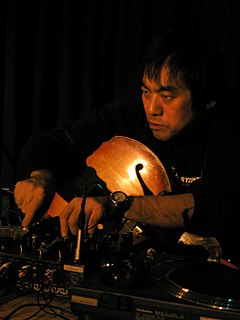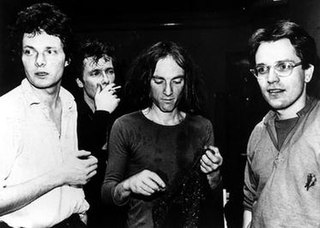| p53 | |
|---|---|
 | |
| Live album by | |
| Released | 1996 |
| Recorded | 16 September 1994 |
| Venue | 25th Frankfurt Jazz Festival, Germany |
| Genre | |
| Length | 44:08 |
| Label | Recommended (UK) |
| Producer | Chris Cutler, Lutz Glandien |
p53 is a 1996 live album by experimental music group p53. It was their debut album and was recorded at the 25th Frankfurt Jazz Festival in Germany on 16 September 1994. It was released in 1996 in the United Kingdom by Recommended Records. [1]
Experimental music is a general label for any music that pushes existing boundaries and genre definitions. Experimental compositional practice is defined broadly by exploratory sensibilites radically opposed to, and questioning of, institutionalized compositional, performing, and aesthetic conventions in music. Elements of experimental music include indeterminate music, in which the composer introduces the elements of chance or unpredictability with regard to either the composition or its performance. Artists may also approach a hybrid of disparate styles or incorporate unorthodox and unique elements.
p53 was an experimental music group commissioned by English percussionist Chris Cutler to play at the 25th Frankfurt Jazz Festival in Germany in September 1994. Their performance was recorded and released by Recommended Records in 1996 on a live album entitled p53. The group reassembled in May 1997 to play at the Angelica International Festival of contemporary music in Bologna, Italy. In November 2006 an orchestral version with three soloists, Jon Rose, Zeena Parkins and Chris Cutler performed with the BBC Scottish Symphony Orchestra in Glasgow, Scotland, which was recorded and broadcast by the BBC in March 2007. This version was performed again at the Opera House in Milan in 2014 with the Orchestra de Teatro Communale, with soloists Daan Vandewalle and Thomas Dimuzio.

Recommended Records (RēR) is a British independent record label and distribution network founded by Chris Cutler in March 1978. RēR features largely "Rock in Opposition" and related music, but it also distributes selected music released on other independent labels.
Contents
p53 was a musical improvisational project that involved two classical grand pianists, a percussionist, a homemade guitarist and turntablist, and a real-time sampler/processor. [2] [3] [4]

Musical improvisation is the creative activity of immediate musical composition, which combines performance with communication of emotions and instrumental technique as well as spontaneous response to other musicians. Sometimes musical ideas in improvisation are spontaneous, but may be based on chord changes in classical music and many other kinds of music. One definition is a "performance given extempore without planning or preparation." Another definition is to "play or sing (music) extemporaneously, by inventing variations on a melody or creating new melodies, rhythms and harmonies." Encyclopædia Britannica defines it as "the extemporaneous composition or free performance of a musical passage, usually in a manner conforming to certain stylistic norms but unfettered by the prescriptive features of a specific musical text. Improvisation is often done within a pre-existing harmonic framework or chord progression. Improvisation is a major part of some types of 20th-century music, such as blues, jazz, and jazz fusion, in which instrumental performers improvise solos, melody lines and accompaniment parts.

Classical music is art music produced or rooted in the traditions of Western culture, including both liturgical (religious) and secular music. While a more precise term is also used to refer to the period from 1750 to 1820, this article is about the broad span of time from before the 6th century AD to the present day, which includes the Classical period and various other periods. The central norms of this tradition became codified between 1550 and 1900, which is known as the common-practice period.

A percussion instrument is a musical instrument that is sounded by being struck or scraped by a beater including attached or enclosed beaters or rattles struck, scraped or rubbed by hand or struck against another similar instrument. The percussion family is believed to include the oldest musical instruments, following the human voice.












